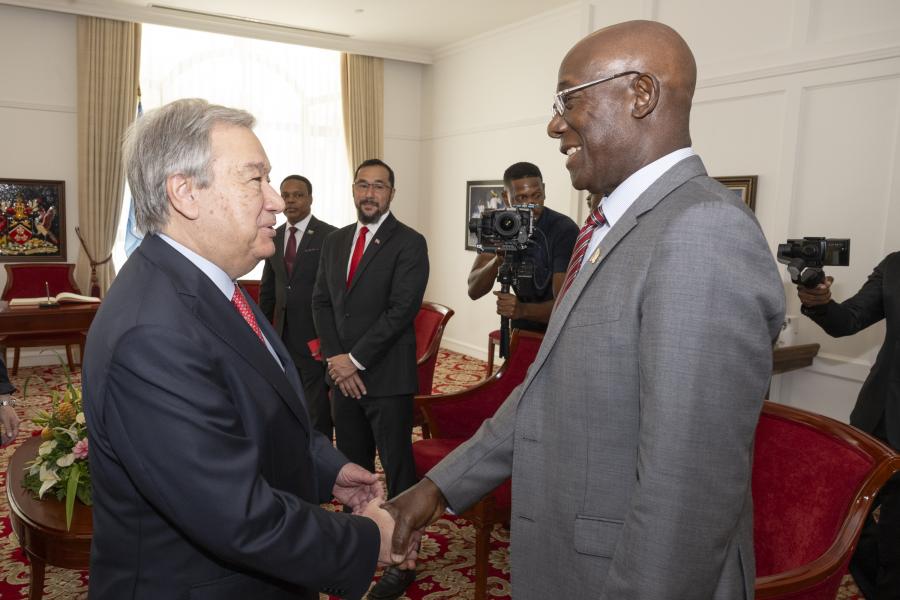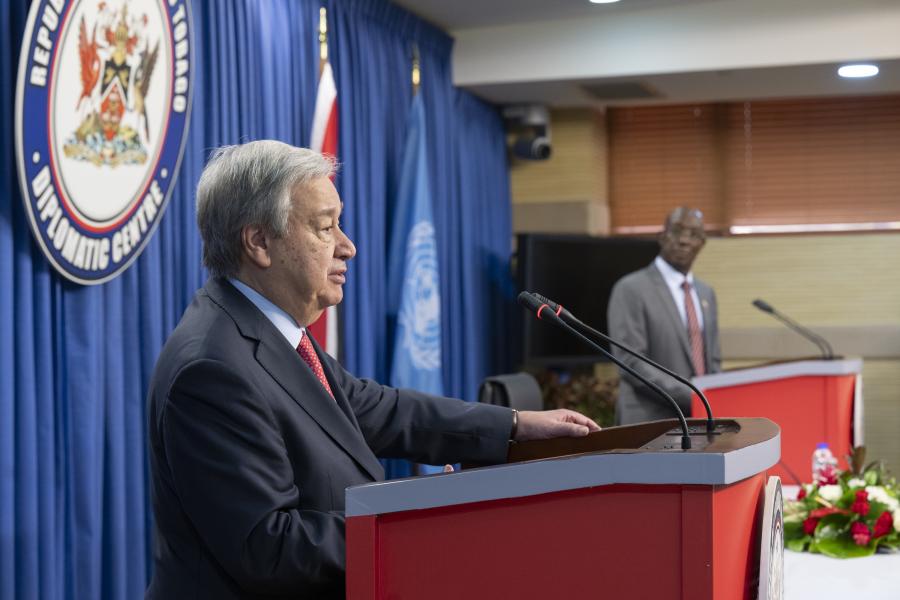UN Secretary-General: 'Caribbean Tackling Biggest Problems of Our Time'

𝐔𝐍 𝐒𝐞𝐜𝐫𝐞𝐭𝐚𝐫𝐲-𝐆𝐞𝐧𝐞𝐫𝐚𝐥 𝐀𝐝𝐝𝐫𝐞𝐬𝐬𝐞𝐬 𝐉𝐨𝐢𝐧𝐭 𝐏𝐫𝐞𝐬𝐬 𝐂𝐨𝐧𝐟𝐞𝐫𝐞𝐧𝐜𝐞 𝐀𝐟𝐭𝐞𝐫 𝐁𝐢𝐥𝐚𝐭𝐞𝐫𝐚𝐥 𝐖𝐢𝐭𝐡 𝐓&𝐓'𝐬 𝐏𝐌
The UN Secretary-General, António Guterres, and Prime Minister, Dr. Keith Rowley, attended a bilateral meeting at the Diplomatic Centre in Port-of-Spain on Monday, July 3. Following are the Secretary-General's remarks to the press following the bilateral:
Honourable Prime Minister, Ladies and gentlemen of the media,
Good morning.
It is wonderful to be in Trinidad and Tobago – in “sweet, sweet TnT”.
I understand that if I want to be “Trini to de bone” I will have to learn how to “ramajay” and “dingolay” and eat plenty of “doubles”!
I have already filled my suitcase with chocolate from Grande Rivere and Brasso Seco and I must say I tasted them last night and the problem was to stop.
Mr. Prime Minister, thank you very much for your warm welcome.
Trinidad is a fitting place to mark CARICOM’s 50th anniversary.
Your country is an example of the strength and richness that comes from unity in diversity.
And your region is an example of the power of a shared moral voice for global change.
Caribbean nations may be small in size – but you are taking on the largest challenges of our age.
You are on the frontiers of global debates around climate action, finance justice, and sustainable development.
I am pleased that those global debates in the coming year will be led in the UN General Assembly by its new President – and proud Trinbagonian – Ambassador
Dennis Francis.
His election is testament to the value the international community places on Caribbean expertise and leadership.

And it continues Trinidad and Tobago’s legacy of leadership in multilateral affairs – from the champion of international justice and one of the main architects of the International Criminal Court, the late Arthur Robinson, to pioneers of the Law of the Sea like Lennox Ballah and Anthony Lucky.
I also want to salute Trinidad and Tobago for introducing the General Assembly Resolution on “Women, Disarmament, Non-proliferation and Arms Control”, which recognized the essential role of women in advancing peace and security.
You have served with distinction on the Security Council, the Economic and Social Council, and a range of other UN bodies and organs.
The United Nations is proud to be your partner.
As I have just discussed with the Prime Minister, we are united across the spectrum of our shared priorities.
United in calling for transformative reforms to an international financial system that is failing developing and emerging economies.
Our UN Country Team is working with Trinidad and Tobago on a Multidimensional Vulnerability Index – to ensure you receive the support you need in the face of immense external shocks.
We are united in pursuit of multilateral solutions to global problems – from tackling widening inequalities, to bolstering citizen security, to the achievement of the Sustainable Development Goals, to advancing peace, and to fight the trafficking of drugs and weapons.

I have come here from Haiti, where the security situation is rapidly deteriorating, and humanitarian needs are soaring.
I reiterate my call on all partners to increase support for Haiti’s national police – in the form of financing, training, or equipment.
And we must collectively do more to help the Haitian people chart a path towards elections and a political solution.
But there can be no lasting security without strengthened democratic institutions – and there can be no strong democratic institutions without a drastic improvement in the security situation.
That is why I have been advocating for the deployment of an international security force authorized by the Security Council and able to cooperate with the Haiti National Police to dismantle the gangs that have created this unprecedented violence.
And I register the fact that those African and Caribbean countries have shown their availability to participate in this effort. And I appeal to those that have the capacity to do so to also volunteer themselves.
Ladies and gentlemen of the media,
We are also united in urging more ambitious action against the climate crisis that is threatening the very survival of small island and low-lying coastal states.
We must cut carbon emissions by 45 per cent in this decade to limit global heating to 1.5 degrees Celsius and avoid the worst impacts of climate change.
It is still possible – but it requires action by everyone, on every front.
That is why I have called for a Climate Solidarity Pact, in which all big emitters make extra efforts to cut emissions and wealthier countries mobilize financial and technical resources to support emerging economies.
And it is why I have presented a plan to super-charge our efforts: the Acceleration Agenda, which includes calls to urgently scale up support for adaptation and operationalize the loss and damage fund this year.
Yesterday, I had the great pleasure of visiting the Asa Wright Nature Centre. I was struck by its enormous natural beauty – and inspired by your determined efforts to safeguard its incredible biodiversity.
We must step up our actions on every front – for people, for prosperity and for the planet.
And throughout, let us take inspiration from your national motto: “Together we aspire, Together we achieve.”
Because, as a Trinbagonian colleague reminded me the other day: “One hand can’t clap.”
Thank you.

Question: Good morning. Secretary-General, there is the issue of financing for developing countries to mitigate against climate change. How important is that now? And will you be discussing that with CARICOM leaders?
Secretary-General: It is vital. We have been strongly advocating for the reform of the international financial architecture. The international financial system that we have was created after the second world war, when Trinidad and Tobago was not yet a member. The majority of today’s countries were not yet members. We need to adapt the international financial system to the realities of today’s economy. And to make it more fair, and more effective.
At the same time, we see the need to increase substantially the amounts of funding for adaptation. Mitigation is essential. We must reduce emissions, but we should not forget that many countries are already suffering the dramatic impacts of climate change and those that suffer most are not those that contribute more to the problem. So, we need to increase substantially the financing to adaptation. There was a decision in the last COP to put the loss and damage fund in place, but we need to operationalize it, and this is vital this year. And at the same time, we need to make sure that namely small island [developing] states - that are middle income countries and in some even high income countries, but most of them middle income countries - small island developing states need support in debt relief and need support in concessional funding and because they are middle income countries, they are excluded from that. That needs to change.
And at the same time, you need to have a much stronger action of multilateral development banks. They need to be more capitalized and they need to change their business model in order to be able to leverage much more, the private finance that is necessary to make sure that we are able to respond namely in the developing world to the very dramatic impacts of climate change. But this is true for climate, but it’s also true for development in general.
It is true for all the Sustainable Development Goals. Countries need to be able to invest in their education systems, in their health systems. Today Africa spends more money in paying debts than in their health system and this is the kind of injustice that should not prevail in today's world.
Question: Sir, Trinidad and Tobago, as a small island state, also is a producer of oil and natural gas. In the context of the energy transition and the UN’s push for climate change, you also have nations like Trinidad and Tobago saying that they have these resources that they also need [inaudible]. What is the UN’s position on that particular issue?
Secretary-General: Well, we have a general position in relation to fossil fuels. We are, as you know, clearly in a position to say that we need to progressively phase out fossil fuels and progressively have renewable energy as the way to sustain economic development in the world.
But if you have listened to my recent position on this, I have advocated for what I call a just and equitable transition, which means not all countries need to be treated in the same way. And the rhythm and the logic of the phase out is different according to the different conditions that different countries might have.
Question: As you’re here for the CARICOM meeting, CARICOM has been calling, for example, for the US to assist on the war on illegal guns and ammunition entering the region. I'm wondering from the UN's position, which is something that is more of a concern – for let’s say regional bodies like CARICOM and the UN in general - the issue of climate change or the issue of illegal guns, ammunition, crime, that sort of thing?
Secretary-General: I think both are essential. You cannot opt for one or the other. We need to face both challenges. Of course, climate change is an existential threat for the whole planet. The questions of gun trafficking and weapons trafficking are more geographically limited. But in a region, like the Caribbean, I think today - and we discussed that with the Prime Minister – we tended in the past to look into arms and weapons trafficking as a kind of a sub product of drug trafficking but unfortunately, we are witnessing that arms trafficking are becoming a problem in itself. And are severely undermining the security of several countries and namely several countries in the region, and I believe it’s necessary to look into the arms trafficking as a serious threat to global peace and security and to adopt international measures in order to be able to curb this dramatic phenomenon.
We see, I mean, Haiti. The tragedy of Haiti, the violence of Haiti, the horrible capacity of the gangs would not exist if there was no weapons trafficking into Haiti, and so, this must be a full priority for the international community.
Of course, it’s not because of this that we are going to forget climate change. The two things are necessary.
Question: Regarding the situation in Haiti. Will you be asking for CARICOM nations to put together a security force that will go to Haiti or will they have to wait another six months for the Security Council to meet?
Secretary-General: I must tell you that it's time for all those that have the capacity to create the basic conditions for this force to exist, to volunteer themselves to participate.
The question is not a question of the Security Council decision. The most important problem is that we need to have countries that have the robust kind of police force, and the robust kind of equipment and logistics support to be able to also volunteer themselves. I've seen African countries volunteering. I've seen countries in the Caribbean volunteer, but most of them have limited capacity.
So, I think we need to have the key players also having a very strong commitment to also participate in such an operation. I believe the Security Council will support and will convey the necessary mandate.

